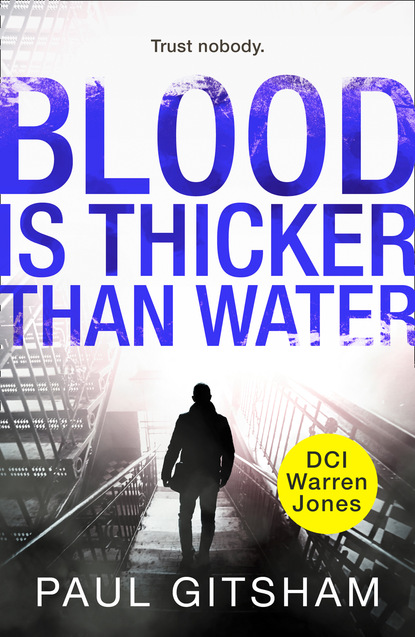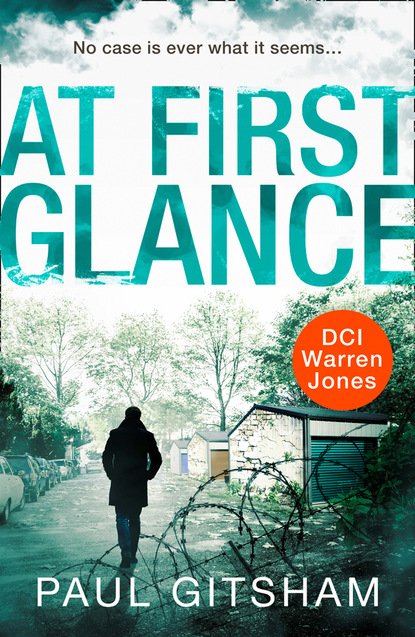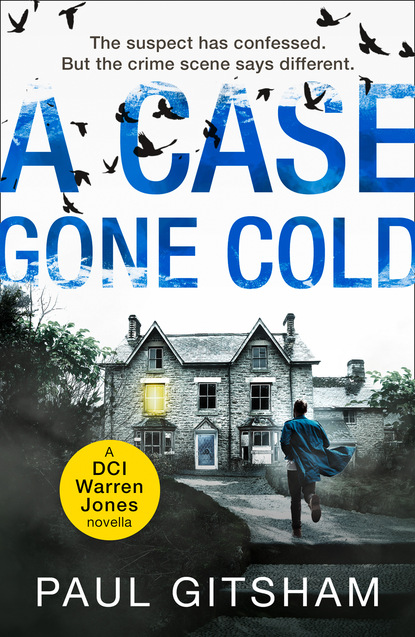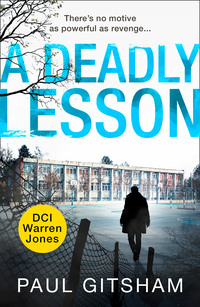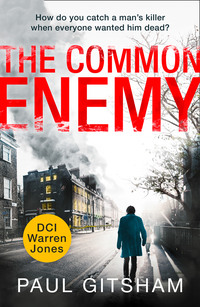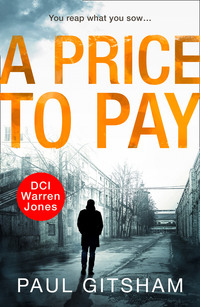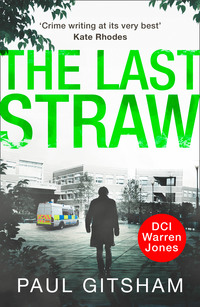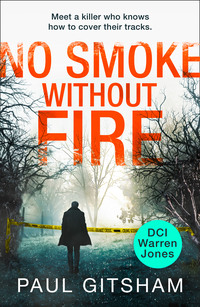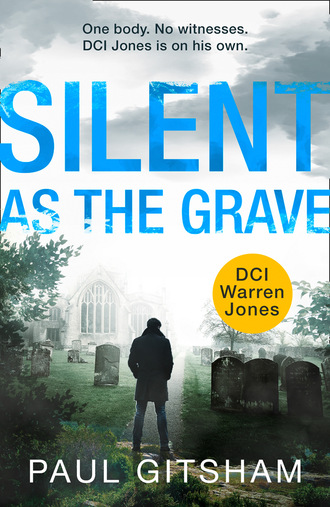
Полная версия
Silent As The Grave
Kent snorted in amusement. “His bark’s worse than his bite. Although he can certainly bark loud enough.”
Warren winced. Kent was at the far end of the room from Grayson’s office. “You heard that then?”
He smiled. “Why do you think half the office has gone for a coffee break?” Kent’s smile faded. “How was he?”
No need to ask who “he” was.
Warren shrugged, replying cagily, “I never met him before today, so I can’t say if he was any different to when he worked here.”
Kent said nothing, waiting.
“But unless he was unkempt and a daytime drinker when you knew him, he’s probably not doing as well as you hope.”
Warren’s sympathy for his predecessor was close to non-existent; however, he had been a much-loved boss and people like Pete Kent had known him for years. Warren would have to be careful not to be too dismissive of their feelings.
“What can I do for you anyhow, Chief?”
Although all officers in CID could use HOLMES 2, the service-wide computer database that was used to store records and reports on major incidents, Warren had a feeling he’d need specialist help.
“I need details on a cold case from the eighties. Will they be available electronically?”
DS Kent looked at him warily. “They might be. The original HOLMES went live in 1986 for major incidents, but it’s a bit patchy. It hasn’t got half the functionality of HOLMES 2 and some forces still did a lot of their record keeping manually, scanning them in after the fact. The cross-referencing can be pretty poor. What do you need?”
“I need the records for a joint Hertfordshire – West Midlands Police operation concluded in 1988. I don’t have an operation name, but it resulted in the conviction of a Vinny Delmarno. If you could get me his records as well, that would be great.” Warren glanced at the clock above Kent’s head; the man’s shift finished in half an hour. “Actually, get Gary on it when he returns from his break.”
“I’ll do it, Chief. I’m not in a rush. Gary’s finishing himself in a few hours then he and Karen are off on that dirty get-away they think nobody knows about. I’ll only end up reinventing the wheel if he starts the job and then hands it over.”
Warren thanked the man and turned to head back to his office, before another idea struck him. “Could you also get onto Revenue and Customs and check the tax and National Insurance returns for Reggie Williamson during the same time period? I’d like to know what he was doing and who he was working for back then.”
“I’ll see what I can do,” the older man promised, “but it may take a while. HMRC deal with most requests during office hours.”
“Well do what you can. I’ll be in my office. Print it out when you’re done.”
One last thought occurred to him, he glanced over at Grayson’s office before leaning in to Kent. “Do me a favour and keep this between us for the time being.”
Kent glanced over at Grayson’s office and smirked slightly, as Warren had known he would. “Of course.”
* * *
Tony Sutton was a lot politer than Detective Superintendent Grayson. Nevertheless he made it quite clear how reckless he thought his DCI had been; and was similarly disapproving of Warren’s tacit agreement to help clear Sheehy’s name as a reward for more information.
Warren had wrestled with the revelations that Sheehy had made all the way back to CID. He’d been standing in front of Grayson, absorbing the man’s anger before he’d eventually decided that he wasn’t ready to share everything Sheehy had revealed to him or broach the subject of his father’s death with the man.
The wound that Sheehy had so brutally reopened on Middlesbury Common was gaping wide and Warren was confused and bewildered; however, his instincts were telling him that he couldn’t trust the man until he knew more.
To somebody of Warren’s age, those events in the mid eighties seemed a lifetime ago, but he was uncomfortably aware that officers such as Gavin Sheehy and John Grayson had started their careers back then and were still in the force today, working in positions of influence and responsibility.
Sheehy’s account had almost made it sound as if he and MacNamara had planned the whole stitch-up single-handedly, but even back in the eighties the police didn’t work that way. The two officers would have been part of a much larger team and it was almost inconceivable that they worked alone or were even the masterminds of the subterfuge. Until Warren read the report on the case, he wasn’t sharing the contents of the manila folder, sandwiched between his stab vest and shirt, with anybody.
Chapter 11
“Is that all we’ve got?”
The pile of printouts was surprisingly small for such a major incident.
“For the moment. West Mids were charged with entering the paperwork into HOLMES, but they prioritised the key documents.” Kent looked apologetic. “I’m still tracking down everything as it’s been filed a bit sloppily. I guess once they’d secured his conviction they expected him to die in prison and so they didn’t bust a gut scanning everything in. These are the records for Vinny Delmarno. I’ll get the rest to you when I’ve collected it all together.”
“Well I’m sure that if it’s in there you’ll find it, Pete. Thanks.”
The documents had been divided into two piles and joined together with oversize paperclips. The first was the record for Vincent (Vinny) Delmarno. Warren recognised the formatting from the Police National Computer. The second was other associated paperwork, such as reports from the National Probation Service.
Like all prisoners released from a life sentence, Delmarno had to serve out the rest of his sentence “on licence”. According to the NPS, he lived with his wife on the easternmost fringes of Middlesbury, reporting to his probation officer fortnightly. The latest account was dated the beginning of the month and reported that he was meeting the terms of his parole satisfactorily.
A biography of Delmarno had attached photographs showing him after his arrest and more recently on release. Warren stared at them. Was this the man who had killed his father? He felt a cold shiver run down his spine. Over two decades in prison had changed the man almost beyond recognition.
According to his date of birth, Delmarno had been just shy of thirty-five years old when he’d been convicted, a little younger than Warren was now, but his hair was already snow white. His face was swollen and darkened, a symptom of his end-stage-renal failure.
By contrast, the photograph taken upon release showed a fit-looking man in his late fifties. Although lined and hardened, the face had lost its swelling and the skin tone had returned to the natural, olive complexion that spoke of his Italian heritage. His hair, though white, was as full as the day he went in.
The one feature that had not changed was his eyes. Warren had seen thousands of mugshots over the years, but rarely had he seen such hatred staring out of a photograph at him.
The biographical details were terse and factual, but Warren found himself filling in the missing details with his own knowledge both from his upbringing in Coventry and the time he served with the police.
Delmarno had been born in July 1953, the son of an Italian father and an Irish Catholic mother who’d met in Coventry shortly after the war. Both parents died whilst he was in prison. Schooled at one of the city’s three Roman Catholic secondary schools—not the one he’d been to, Warren was strangely relieved to see, even though they would have attended twenty years apart—he’d been expelled at age fifteen for fighting. After a few minor skirmishes with the law as a youth, he apparently avoided arrest until 1988.
The list of crimes of which he was suspected filled three pages. Drug dealing, living off immoral earnings, assault and attempted murder. In almost all cases, charges either weren’t filed or were dropped.
As Sheehy had explained, it was the shooting of Frankie Cruise in 1984 that was his undoing and the search warrant obtained after the handgun was “found” at the scene of a drugs bust in Coventry had led to his trial on a dozen further charges, including two counts of conspiracy to murder, money laundering and possession with intent to supply. As in the past, he was cleared of many of the charges when witnesses failed to attend or his lawyers successfully had them thrown out on a technicality. Nevertheless he received life with a minimum sentence of twenty-two years and eight months for the murder of Frankie Cruise.
He was released on 6 September 2010.
The final page contained a list of Delmarno’s known associates. Most were either behind bars themselves or dead, either of natural causes or murdered. It also listed his wife, Jocelyn, and his son, born five years before his father’s incarceration.
If Warren had expected some remarkable insight into the events of the past week or even twenty-four years previously, he was to be disappointed.
“Anything you want me to do before I go home, Boss?”
The question was as much a peace offering as anything else and so Warren felt even more guilty as he dismissed Tony Sutton for the evening. The older man had looked at him for a few, long seconds before nodding and saying good evening. Sutton was no fool; he knew that Warren was hiding something from him. The two men had barely spoken over the last few hours; for want of a better word, Sutton seemed to have been sulking.
That suited Warren fine. He hadn’t yet decided how much to share with Tony Sutton. The man had been investigated immediately after Sheehy’s arrest and cleared of any wrongdoing, but Warren couldn’t dismiss the possibility that he was helping his former DCI and friend to play him, manipulating him to help clear the man’s name. Warren hoped that wasn’t the case. He’d come to value Sutton’s counsel—and friendship, he realised. Until he could be sure, though, he was on his own.
Chapter 12
It was late by the time that Warren arrived back home. Susan’s expression suggested that he was in for another earbashing—it was definitely today’s theme.
“You did what?”
“I already knew who he was. I was certain that I wasn’t in any danger. Besides, I had my stab vest on.”
“Covers your neck does it?” Even when angry, his wife could be logical to a fault. “So what did this Gavin Sheehy want? Did he actually have any evidence to help you work out who murdered that poor man?”
“I’m not sure. The folder he gave me was just the write-up of a fatal collision over the New Year. Nothing jumped out at me.”
The two of them had moved into the lounge and the red wine Susan had poured herself seemed to cool her temper somewhat. Nevertheless, Warren was reminded that Susan’s temperament probably owed more to her fiery mother than her decidedly docile father.
Warren had been thinking about what to tell his wife ever since he’d left the office. The fact was, he needed a sounding board; his decision not to tell Tony Sutton the full details of his conversation with Sheehy had left Warren feeling isolated and he valued his wife’s insights. And he needed her support. He closed his eyes.
They had been dating for more than two years before Warren had told Susan the full story of his father’s suicide. They’d been on holiday in Prague, lying in bed after a romantic meal down by the Charles Bridge. Warren had never shared his true feelings about his father’s death and how it had affected him.
He’d been scared that people would see him differently—and he was ashamed. He knew he shouldn’t be—that his father’s sins were not his own, but he couldn’t help it.
Susan had listened without saying anything, her tight embrace easing his halting speech until it was flowing like a tap—years of hurt and resentment finally getting its release. When he was eventually finished, she’d whispered into his ear, “Thank you.”
The next day, standing on top of Petřín Hill, Warren had asked her to marry him.
The touch of Susan’s hand brought Warren back to the present.
“For most of my life, I’ve thought my father abandoned me and my mum and brother, that he was corrupt and a thief. Today I found out that I may have been wrong all of these years.”
Warren felt Susan stiffen. She said nothing. And it was as if he’d been transported back in time to that evening in Prague as he again unburdened himself to the woman he loved so much.
“What are you going to do?” asked Susan when he finally finished.
“I don’t know. Gavin Sheehy has admitted that he and my father helped secure an unsafe conviction all of those years ago, he’s not an honest man. But what if he is telling the truth?”
“You can’t ignore it.”
She was right—he had to check the truth of what Sheehy was saying for himself. But how? Events had been successfully concealed for nearly a quarter of a century.
“Sheehy claimed to have more information. You have to get it from him. Whatever it takes.”
“But how can I know if I can trust him?”
“Does it matter?”
“What do you mean?”
“Look at what Sheehy’s asking you to do. He’s basically asking you to investigate the allegations made against him. Furthermore, he’s given you potential clues that could help you solve one confirmed murder and another possible killing. Treat it like any other case. Take what he’s given you and add it into the mix. As for the allegations against him—surely it can’t hurt to do a bit of digging around, to see if he really is being framed?”
“Grayson has banned me from looking into Sheehy’s case.”
“So when has that stopped you before?” She placed her hand on his chest and kissed him lightly on the forehead. “Follow your gut, Warren. You need to see this through. If there is any truth at all to what Sheehy is saying, then you need to know.”
She kissed him again. “We need to know. You can’t let it lie; you know that.”
Warren nodded, wearily. He was exhausted. Not just from the long hours he’d worked, but also the constant adrenaline.
“You’re right,” he admitted. “I’ll get Mags Richardson to look over the report into Dr Liebig’s accident. She worked Traffic before joining CID. She’ll spot any inconsistencies. If it looks as though there are suspicious circumstances, I’ll go back to Sheehy and see what else he has.”
“What about Tony Sutton?”
“Not yet. He was investigated alongside Sheehy when he was first arrested. I need to satisfy myself that he is completely clean before I bring him in on this.”
Susan squeezed his hand again. “Well do it quickly. You can’t work this alone. You need help.”
Susan was right as usual. The logical science teacher had cut through the confusion and suggested a course of action. Marrying her was still the best decision he had ever made.
Chapter 13
He’s walking down the garden path again, the coffee cups balanced in his hands. He tries to stop, the feeling of dread mounting in him, but it’s useless. His legs, ignoring his desperate commands, carry him relentlessly towards the garage door. Towards what he knows lies on the other side.
No, not again, he cries out silently. He knows it’s a dream of course; the same dream that visited him every night for years. Almost a quarter of a century on, the dream comes less often now. But when it does, it’s lost none of its power.
The rusty hasp needs a tug, and the spilled coffee scalds him. As always, he tries to turn back, but try as he might, he’s committed, the same story playing out again and again. His ears are filled with the chugging of the car’s engine. His nose is clogged with exhaust fumes.
And then he’s at the car door, swinging the hammer with all of his strength. Please let it be different this time, he pleads, just this once.
But it’s not. The whisky bottle clatters to the floor as he reaches in to turn off the engine. But he’s too late again. The last thing he sees before he jerks awake, sobbing, is his father’s white, bloodless face…
“Warren, it’s OK. Warren, I’m here.” Susan’s voice was soothing, the warmth of her arms around his chest. Gradually his heart rate slowed, calmed by her gentle caresses.
“The dream?”
Nothing more was required. They’ve been together for eight years and she recognised its symptoms—the crying and the tears, the way he cradled his hand as if scalded by hot coffee. The dream comes to him just a few times a year now, usually around the anniversary or his father’s birthday. It doesn’t take a genius to work out why it’s chosen to come back tonight.
Warren nodded. Reached out for the glass of water on the bedside table and took a long swig.
“I’m OK now. It only ever comes once.” Despite the fluid his voice was croaky.
The bedside clock read three-thirty.
“Go back to sleep.” He kissed her on the forehead.
It’s true, the dream does only come once in a night and afterwards, Warren would sleep a deep and dreamless sleep and would awake in the morning fully refreshed. It’s as if it’s been purged from his system and won’t need to return again for at least a few more nights.
But tonight was different. In a few minutes, Susan’s breathing changed as she drifted back to sleep. But sleep didn’t come to Warren. Try as he might he couldn’t stop thinking about that night, reliving it again. Why? Why wouldn’t his subconscious let it go?
He started to obsess about small details. The way the hasp squeaked as he forced it open. The clatter of the whisky bottle as it hit the floor. His father’s pale, bloodless lips.
The hasp. It squeaked as he forced it open.
As he forced it open.
Suddenly Warren sat bolt upright in bed, realising that what Sheehy had told him must at least be partly true. If his father was inside the garage, who had closed the rusty hasp on the outside of the door?
Sunday 1st April
Chapter 14
Warren finished leafing through the report describing the road traffic collision that had killed the late coroner Dr Anton Liebig and his wife, Rosemary, three months before. Putting it down on his desk he turned to the inquest findings, skimming the legalese before skipping to the narrative verdict. Something wasn’t right; he was sure of it. The deaths and their timing were too coincidental, but to his untrained eye everything seemed normal. Despite his reluctance to involve too many people at this stage, he needed help.
Leaning out of his office door, he summoned DS Margaret Richardson from her desk in the far corner. Richardson was a heavy-set woman in her mid forties. A mother of two, she had worked traffic for a number of years before switching to CID.
Warren pushed the printouts across the desk to her. “I need your expertise. I want you to read these reports and tell me what you see.”
Placing her ever-present bottle of mineral water down next to Warren’s laptop, she fished out a pair of small reading glasses, picked up the pile of papers and started reading.
It took her barely five minutes to finish both of the documents—five minutes that Warren spent trying to appear unconcerned and busy.
“Well it seems fairly straightforward at first glance. I can see why the inquest drew their conclusions.” She raised a hand, ticking off each point. “Dr Liebig was driving late at night, on a narrow country road in poor weather with a blood alcohol level above the legal limit. The car was in good repair, but he was driving too fast for the conditions around a deceptively sharp bend with a reputation as an accident black spot. Best estimates put the car’s speed at over fifty miles per hour prior to it leaving the road shortly after the bend.”
“And the conclusion from the inquest?”
“Pretty much what I’d expect. The car plunged down a steep embankment and impacted a tree, which impaled Dr Liebig through the windshield, killing him instantly. His wife died from massive internal bleeding at the scene as the emergency services attempted to cut her out. Death by dangerous driving, namely excess speed and impairment by alcohol.”
Warren nodded. “Is there anything in the report that doesn’t fit that explanation?”
Richardson’s tone was cagey. “Well, sir, you have to realise that RTCs are complex, especially when there are no witnesses or survivors. There are always unanswered questions; the best we can do is come up with a sequence of events that fits the evidence and decide if an offence has been committed. In the case of a fatal accident, it’s up to the coroner presiding over the inquest to determine if there was anyone at fault, or if steps should be taken to reduce the likelihood of a similar accident. In this case she recommended safety barriers to prevent cars leaving the road, and improved signage.”
Warren leant back in his chair. “OK, I understand that, Mags, but I have reason to suspect that this accident might not be as clear-cut as the report suggests. Are there any inconsistencies here or unanswered questions?”
“Let me have another look.” Picking up the papers again, she took a pen out of a coffee cup masquerading as a pencil pot and raised an eyebrow. Warren signalled his agreement. The originals were safely locked away.
This time, she took longer. Warren forced himself to turn back to his bulging inbox, resisting the urge to try and interpret the officer’s upside-down handwriting. However, he was rereading a missive about next year’s budget predictions for the third time, and still not comprehending it, when Richardson finally put down the papers and cleared her throat.
“Anything?”
“Well, if you want to turn over every stone, there are a few discrepancies, I suppose.” She sounded a little uncomfortable, clearly concerned that she might be overstating her observations.
“I’m all ears,” responded Warren, trying not to sound too eager as he picked up his own pen and turned over a new page in the spiral-bound scribble pad next to the phone.
“First off, his blood alcohol level was 85 milligrams per 100 millilitres. That’s only just above the legal limit. That doesn’t mean he was safe to drive, but he wasn’t pissed. Eyewitness reports state that he drank two small glasses of red wine with a three-course meal, about three hours prior to leaving the golf club. After the wine, witnesses say he switched to soft drinks. An analysis of his stomach contents is consistent with a large meal, traces of red wine and a substantial amount of what appears to be Coca Cola. The pathologist thought there might have been traces of spirits in there, but the blood alcohol results were back so he didn’t pursue it further.”
“What about his blood-glucose levels? The report noted that he was diabetic, but I don’t know enough to tell if they were too low. Could he have become hypoglycaemic and lost control of the car?”
Richardson shook her head. “Unlikely. His blood glucose was 14.2 millimoles per litre. If anything that’s too high. It may have contributed to fatigue or confusion, especially if he was tired late at night and under the influence of alcohol.”
Warren studied her intently. “Your expression tells me you aren’t convinced.”
Richardson sighed. “It may be nothing, but I’m not happy about the skid marks on the road.” She flicked the folder open to reveal flood-lit photographs of the road surface. Two thick, black tyre marks were clearly visible after the apex of the left-hand bend, heading straight on, before veering sharply to the right and off the road. The rear of the Liebig’s Jaguar was just visible at the edge of the image. Its wheels were hanging well clear of the road, hinting at the sharp downward angle that it had come to rest at. Blue smears across its shiny paintwork advertised the presence of emergency vehicles, their flashing lights just off camera.
“It looks to me as though he had made it safely around the bend; although he was travelling very fast he was in a performance car with good tyres. For some reason though, he slammed on the brakes and swerved violently as he exited the bend, losing control.”


